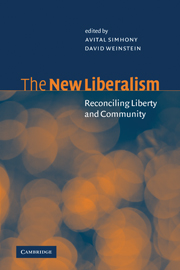Book contents
- Frontmatter
- Contents
- List of contributors
- Acknowledgments
- Introduction: The new liberalism and the liberal–communitarian debate
- 1 Liberal community: an essay in retrieval
- 2 T. H. Green on individual rights and the common good
- 3 T. H. Green's complex common good: between liberalism and communitarianism
- 4 Private property, liberal subjects, and the state
- 5 Neutrality, perfectionism, and the new liberal conception of the state
- 6 Bosanquet's communitarian defense of economic individualism: a lesson in the complexities of political theory
- 7 The new liberalism and the rejection of utilitarianism
- 8 Staunchly modern, non-bourgeois liberalism
- 9 The new liberalism and citizenship
- Select bibliography
- Index
5 - Neutrality, perfectionism, and the new liberal conception of the state
Published online by Cambridge University Press: 06 July 2010
- Frontmatter
- Contents
- List of contributors
- Acknowledgments
- Introduction: The new liberalism and the liberal–communitarian debate
- 1 Liberal community: an essay in retrieval
- 2 T. H. Green on individual rights and the common good
- 3 T. H. Green's complex common good: between liberalism and communitarianism
- 4 Private property, liberal subjects, and the state
- 5 Neutrality, perfectionism, and the new liberal conception of the state
- 6 Bosanquet's communitarian defense of economic individualism: a lesson in the complexities of political theory
- 7 The new liberalism and the rejection of utilitarianism
- 8 Staunchly modern, non-bourgeois liberalism
- 9 The new liberalism and citizenship
- Select bibliography
- Index
Summary
This chapter will consider the British new liberal theorist L. T. Hobhouse in light of three different sorts of assumption often made today about the character of liberal political argument. The first assumption is that liberals are “individualists.” An atomistic conception of society, an image of the human “self” abstracted from all social ties, and an affirmation of the ethical primacy of the individual are considered typical of liberalism. In short, liberals marginalize community, focusing almost exclusively on the rights of individuals and the autonomy of the individual moral agent. The second assumption is that liberalism can be identified with a straightforward affirmation of the virtues of the free market, private property, and self-help. Liberals are held to resent government interference with economic processes, believing that people are entitled to rewards for effort and initiative, and that economic freedom is an essential component of individual liberty. The third assumption is that liberals are advocates of “state neutrality” – they believe that the state should in some sense remain “non-aligned” with respect to the competing conceptions of the “good life” manifest among its citizens. To privilege ways of life selected by some individuals over those favored by others is to fail to treat all citizens equally, and so constitutes an illegitimate exercise of public authority.
The first of these claims about liberalism has a long-established pedigree and is encountered quite generally.
- Type
- Chapter
- Information
- The New LiberalismReconciling Liberty and Community, pp. 115 - 136Publisher: Cambridge University PressPrint publication year: 2001
- 3
- Cited by



